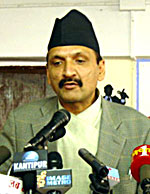 The government is ready for peace talks. The common minimum program prepared during the formation of the present coalition government also has peace talks as its main agenda. That's why the government has agreed to discuss all the issues raised by the Maoists, guaranteeing security for Maoist leaders who appear for talks. Since the government has demonstrated so much flexibility, it is now the rebels' turn to reciprocate. If their demands are met before negotiations, why should talks be held at all?
The government is ready for peace talks. The common minimum program prepared during the formation of the present coalition government also has peace talks as its main agenda. That's why the government has agreed to discuss all the issues raised by the Maoists, guaranteeing security for Maoist leaders who appear for talks. Since the government has demonstrated so much flexibility, it is now the rebels' turn to reciprocate. If their demands are met before negotiations, why should talks be held at all? The Maoist insurgency is an internal problem involving Nepalis on both sides, which is why we believe we must take the initiative for peace talks. The previous talks resulted from the agreement between both sides. We don't think we need a foreign facilitator or mediator. If the Maoists want peace through talks, the problem can be solved without external support. We expect cooperation from all sides including the United Nations but there is no guarantee that UN mediation can solve it. We must aim for the future. The dissolution of the House of Representatives is a matter of the past. The only way to activate the House is through elections. If talks cannot be held because of the Maoists, elections will be the only other way out. Indeed, holding elections will be difficult. The number of voters might be low but that does not mean we will not be able to hold it.
It is democratic to activate electoral institutions. This government has no alternative to elections. In the past, the Maoists could force resignation of nominated officials in elected bodies. But once these institutions have their representatives, it will not be easy for the rebels to force their resignations again.


